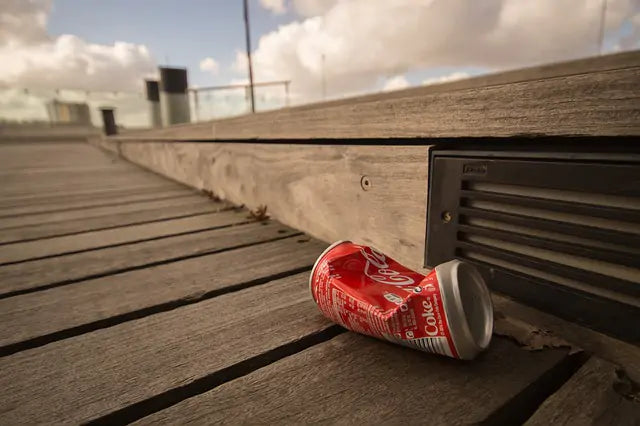OR
Express Checkout

According to the latest figures, it cost local authorities £699 million to clean up litter from our streets in 2018-19. That’s £30 of your hard-earned cash spent solely on clearing up after people who drop litter. Despite many campaigns and initiatives, litter is a growing problem. Here’s how to stop littering for the sake of the environment and your pocket.
You might think nothing of dropping that chocolate wrapper or throwing that drink can out the window. However, every piece of litter that ends up in the environment has the potential to cause harm. Toxins from bits of plastic end up leaking into soil and groundwater causing pollution. Litter is blown into drains and waterways where it pollutes water and endangers marine life. It can also cause injury or death if wildlife tries to eat it or gets trapped in it.
The litter statistics often make grim reading. However, there are some simple things you can do to stop littering.
If you want to stop littering, investing in reusable items is the way to go.
If you are on the go, dispose of your rubbish in a proper bin. No bin? Carry a plastic bag with you and secure it in there until you get home. If you’re a smoker, don’t discard your cigarette butts, find a cigarette bin. Cigarettes contain some nasty chemicals which can end up in groundwater, drains, and on our beaches. Discarded cigarette butts are one of the most commonly littered items. In the last Great British Beach Clean, volunteers found 46 cigarette butts per 100 metres of beach.
One way of reducing cup waste is to have good quality and well placed cup recycling bins. Our range include coffee cup recycling bins and also plastic and paper cup recycling bins. By placing these in easy reach of where people normally place cup waste, we can increase the amount of cups that reach recycling point and to stop littering!
There are plenty of outside bins around and even if you can’t see one, you can easily take your litter home. There’s no excuse; think of the planet and stop littering!
Single-use items are wasteful and terrible for the environment. Yes, they can be convenient, but they come at a cost. Anything you can only use once is a waste of materials and resources. If those items then end up as litter it only adds to the burden of waste on the planet.
One of the best ways to encourage this in the office is to setup a recycling group with other like-minded colleagues and discuss ways you can improve how your office is using single-use items. One of the quickest wins we have found is to get everyone a reusable hot and cold bottle which can even be branded. Not only does this softly promote the environmental cause but colleagues feel like they are getting something good for free. What every office must still ensure though is that everyone still has easy access to office bins for recycling. If single-use plastics which can be recycled like some bottles are used they must be recycled properly.
A good way to stop littering is to figure out which single-use items you use regularly. We’ve already mentioned investing in reusable water bottles and coffee cups. What about using beeswax wraps for food instead of clingfilm? Ditching the baby wipes and using reusable cloths? Preparing food, drinks, and snacks before you head out instead of buying on-the-go food with its excess packaging?
There are so many ways to stop littering. However, to really tackle it, the first step is admitting there’s an issue. According to government figures, 28% of people don’t think litter is a problem. On the plus side, there are around 580,000 volunteers dedicated to clearing up litter across the UK. You could be one of them, or you could just start by following our tip to stop littering. Every little bit helps. For more interesting articles on litter, litter bins, and the environment, check out the rest of our blog or check out some of our most popular articles:
- World's Greenest City 2022
Or check out our most popular wheelie bin sizes and colours
- Washroom Bins
- Commercial Recycling Bins
- Battery Bins